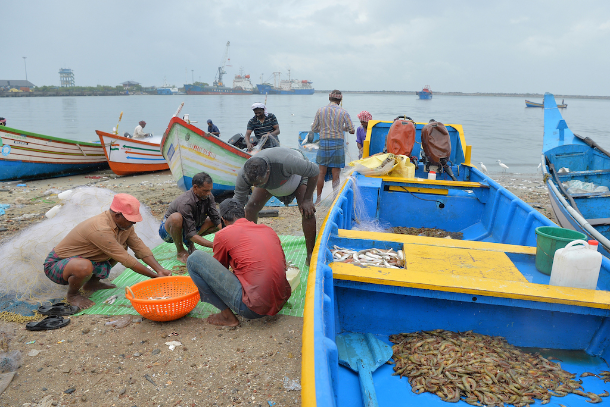Selfless seamen refused payment for carrying boats on lorries inland to save children and adults

Fishermen sort their catch after returning to shore from the Arabian Sea at Kollam beach in Kerala on Aug. 22. Tourism Minister K.J Alphons has called fishermen the “biggest heroes” of Kerala’s flood disaster. (Photo by Manjunath Kiran/AFP)
Fishermen in India’s Kerala state are being hailed as heroes for using their traditional wooden boats to rescue men, women and children from swirling floodwaters.
“You are like our God,” a woman with folded hands told fishermen who saved her along with another female villager and 30 youngsters trapped in a children’s home in Alappuzha district, an area laced with waterways.
The fishermen, mostly Catholics and Muslims on the Arabian Sea coast, formed their own voluntary rescue service during flash flooding from Aug. 15-18.
While some people were just temporarily isolated by deluges, the lives of others were in serious peril as rising floodwaters submerged homes.
A team led by Raju Thomas from Trivandrum Archdiocese, some 200 kilometers away, carried their boats on lorries to the disaster area in central Kerala.
“We could not see the children’s home,” he said. “We found them after we heard the children screaming.”
Raju’s team was one of several organized by the local archdiocese. Fishermen from coastal Cochin, Quilon and Aleppy and Trivandrum were among some 1,500 fishermen who joined rescue operations.
On many occasions they were able to skilfully maneuver their small traditional boats into places when helicopters were unavailable or unable to reach victims because of overhanging trees.
And there was an insufficient number of naval vessels to deal with the scope of the calamity.
Trivandrum Archdiocese alone organized 130 boats manned by 500 fishermen, said coordinator Father Shijin Jose. It was a difficult operation as fishermen had to pass through narrow lanes in residential areas.
“Many of the boats were damaged,” Father Jose said. “But they repaired them and completed the mission successfully.”
Government officials offered fishermen 3,000 rupees (US$42) daily to compensate for the loss of their livelihoods. However, they refused the offer as they just wanted help people in distress, the priest said.
Several fishermen who joined the operation told ucanews.com that their biggest reward was the relief they saw on the faces of those they saved.
“We can’t express, in words, the gratitude they showered on us,” said Shoji Dency, a fisherman from Chellanam in Cochin Diocese. “We belong to the lowest level of the society but most people we saved are rich. We felt sad when they pleaded with us to save their lives with folded hands.”
State Chief Minister Pinarayi Vijayan told media representatives that aiding more than one million people marooned in the floods, or cut off by landslides, was a mammoth task that could not have been accomplished by government agencies alone.
Many lives had been saved because of people cutting across caste, communal, class and religious lines worked hard without rest, he said.
According to the Kerala Disaster Management Authority (KSDMA), floods during the entire monsoon season claimed 383 lives and resulted in more than 1.3 million people being shifted to 3,612 relief camps.
“The unprecedented rain has dealt a big blow to the state economy,” Vijayan said. “As per preliminary assessment, the loss to the economy would come to more than 200 billion rupees (US$2.8 billion). Rebuilding it is a Herculean task.”
The unusually persistent southwest monsoon continued into August, filling reservoirs and forcing managers to open the gates of more than 35 dams. This caused flash floods in many residential areas
In some cases water rose to the roof levels of houses, said one man who was rescued along with his aged parents, wife and two children by fishermen from Cochin.
As well as the fishermen and naval personnel, teams from the army, air force, coast guard, National Disaster Response Force, state police and state fire service battled round the clock to conduct rescue operations.
Some 1,500 people stranded at the Catholic Divine Centre in Chalakudy had relief supplies dropped to them by air.
According to the Indian Meteorological Department, rainfall in Kerala this monsoon season was 42 percent above the norm.
With the floodwaters receding since Aug. 20, many people are now repairing or rebuilding their ravaged homes amid efforts to guard against the danger of water-borne and air-borne diseases.
Meanwhile, many will remember the brave fishermen and others who worked so hard to save their lives.
